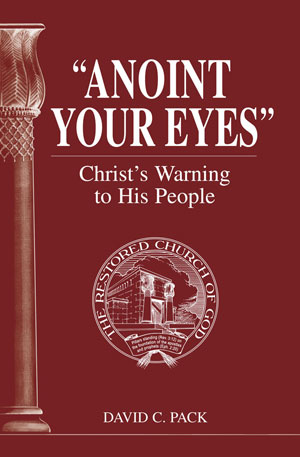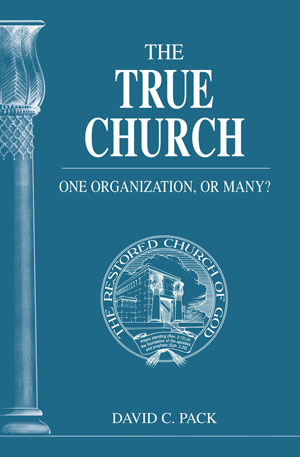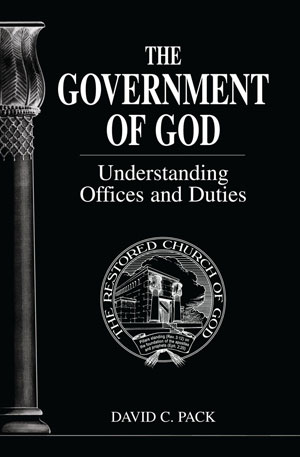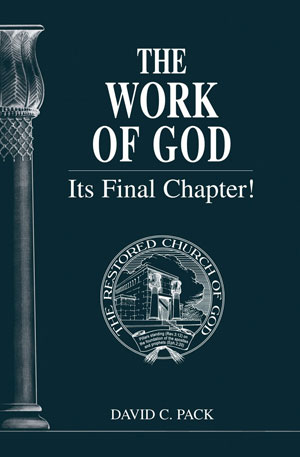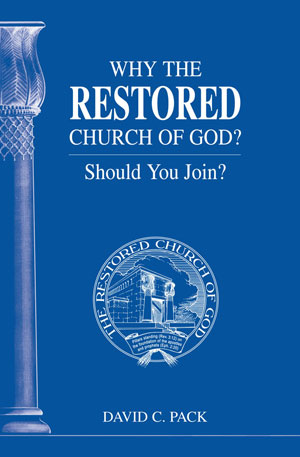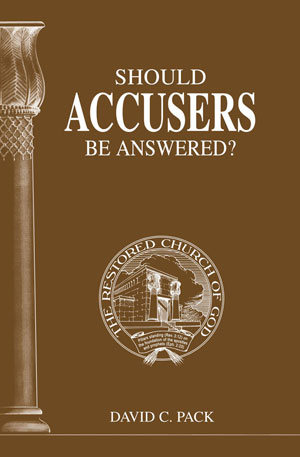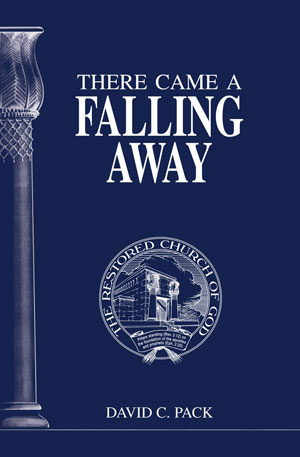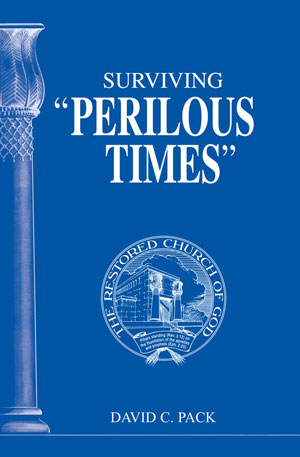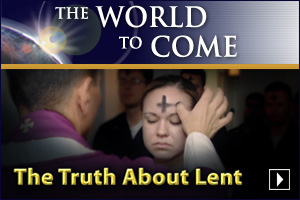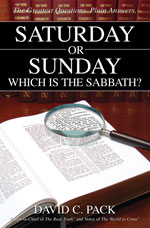Picture the city of Jerusalem in the first century A.D. Under Roman rule, Judaism is recognized as a legitimate belief system, and factions such as the Pharisees and the Sadducees battle to claim the mantle of true religion.
However, the Jews as a whole had long since strayed from what was given to Israel through Moses, adding many manmade traditions, watering down certain standards, by this time even observing Passover on the wrong day.
This was the world into which Jesus Christ was born as a Jew. When He was a young boy, He paid a visit to the Temple in Jerusalem: “And it came to pass, that after three days they found Him in the temple, sitting in the midst of the doctors, both hearing them, and asking them questions. And all that heard Him were astonished at His understanding and answers” (Luke 2:46-47).
Matthew 21 describes Christ coming into Jerusalem again as an adult, shortly before His trial and crucifixion. After He is ceremonially received as a King, a number of well-known events take place in this and the following chapters. He purges the Temple of moneychangers and merchants, heals the blind and lame, and curses a fig tree.
He also rebukes and confounds the Jewish religious authorities of the day—the chief priests, scribes, lawyers, Pharisees and Sadducees—time and again, setting forth parables that illustrate their hypocrisy and stubbornness.
Christ’s Counsel to the Multitude
Chapter 23 begins with a unique account of Christ instructing a large group of listeners. (Notice that here Christ was speaking to “the multitude” of Jerusalem residents, most of whom would never be part of His Church—not privately to His disciples as He does in the next chapter, which begins the Olivet prophecy): “Then spoke Jesus to the multitude, and to His disciples, saying, The scribes and the Pharisees sit in Moses’ seat: All therefore whatsoever they bid you observe, that observe and do; but do not you after their works: for they say, and do not. For they bind heavy burdens and grievous to be borne, and lay them on men’s shoulders; but they themselves will not move them with one of their fingers” (Matt. 23:1-4).
The word “seat” is translated from the Greek word kathedra, which Strong’s defines as “a bench (literally or figuratively); seat.” The English cathedral comes from this word, as does the Latin cathedra, most commonly heard in reference to the Pope speaking ex cathedra—“from the chair.”
This word is found in only two other places in Scripture—Matthew 21:12 and Mark 11:15, where it is used for the “seats” occupied by those who sold doves in the Temple.
Thayer’s adds that the phrase “sit in Moses’ seat” means the scribes and Pharisees at the time did “bear themselves as Moses’ successors in explaining and defending his law.”
As we continue, keep in mind that this phrase is found only here in the entirety of Scripture.
A Modern Application?
We now move ahead to the late 20th century. The Church that Christ went on to found, just weeks after the above instruction was given, has weathered nearly two millennia of trials and persecutions. Its Headquarters has gradually migrated from the Holy Land through Europe and the British Isles to the United States, by the late 1960s using the corporate name the Worldwide Church of God (WCG).
In the wake of the death of Herbert W. Armstrong, apostasy sets in—spearheaded by his successors—and God’s people are scattered in many directions. Thousands leave WCG to join various “splinter” groups, with each offering a unique theology to justify its existence.
During this process, a set of doctrines is born that maintains God’s people should not—in fact, cannot and must not!—leave the WCG, since, as it is portrayed, “God’s government is there.”
One of the key doctrines set forth to support this idea takes Christ’s statement—“the scribes and the Pharisees sit in Moses’ seat”—and asserts that Mr. Armstrong’s successor and his accomplices (who by this time had rejected the true God, His law and nearly all of His doctrines) now “sit in Moses’ seat.”
Thus, those who accept this premise are obligated to “whatsoever they bid you observe, that observe and do.”
Are Christians now under this constraint? Have they ever been?
Baseless Assertions
A “study paper” that promotes this theory was written some years ago by a man who had never served in any spiritual office within God’s Church. While it may have been written with good intentions, it is riddled with error—including many statements and conclusions that have no basis whatsoever in Scripture, arising purely from human reasoning. Let’s examine just a few:
- “Therefore say I unto you, ‘The kingdom of God shall be TAKEN FROM YOU, and given to a nation bringing forth the fruits thereof’” (Matt. 21:43). That ‘nation’—which was to shortly begin bringing forth fruits of that kingdom—is the CHURCH (1 Pet. 2:9). Christ was saying that the Church was to inherit ‘Moses’ seat’—that there would be those within the Church who would BOTH TEACH AND JUDGE by God’s laws. The ‘seat of Moses’ went, specifically, to the apostle Peter—but, just as it was shared under Moses by other judges, the other apostles (with other leaders) SHARED IN THAT SEAT.’”
Re-read Matthew 21:43. “Christ was saying”? Nowhere in that verse does Christ mention Moses’ seat! This is a blatant case of “putting words in Christ’s mouth.” The kingdom of God is not in any sense equivalent to “Moses’ seat.”
“The apostle John was the last of the original apostles to share in that ‘seat.’ But, just as the Church would never die out (Matt. 16:18), the ‘seat of Moses’ would also continue to exist as God raised up new leadership.”
Again, there is no mention anywhere in God’s Word of John—or anyone other than the scribes and Pharisees—sitting in Moses’ seat! This is a particularly far-fetched version of the “baton-passing/papal-style succession” idea that has afflicted a number of splinters. These seem to forget that if, for argument’s sake, we supposed that a “baton” actually existed, then Mr. Armstrong’s successors threw it in a ditch!
“God did not appoint the scribes and the Pharisees to ‘Moses’ seat’—they usurped that ‘office.’ But God allowed it to happen—and he is in control. Likewise, God did not place the Tkach’s [sic] over the WCG—but he allowed it to happen. Christ might just as well have said, ‘JOE TKACH SITS IN MOSES’ SEAT: All therefore [that is good and right] he bids you to observe, that observe and do.’”
“Christ might just as well have said”? This is a leap in logic that exceeds Olympic high jumps, and insults Jesus Christ in the process. Ask yourself: What “good and right” things have Mr. Armstrong’s successors “bid” God’s people to do over the last two decades? Answer: None!
This begins to get to the heart of the matter: Those who profess to honor false leaders in “Moses’ seat” will find that they need not “observe” much of anything, with the possible exception of tithing to the WCG—which now no longer exists corporately under that name. So theirs is a Christianity without obligations, requirements, standards, boundaries or parameters—an environment ripe for human nature to flow unchecked (Rom. 8:7).
Faulty Comparisons
One argument that has been set forth is that the Pharisees and scribes at the time were the equivalent of the “froward master” described in I Peter 2:18: “Servants, be subject to your masters with all fear; not only to the good and gentle, but also to the froward.”
The context makes plain that this was written to members of God’s Church who worked as domestic servants, a common occupation in the Roman Empire (see Eph. 6:9; Col. 4:1)! The direct application of this verse in the modern world would be submitting to (working diligently and obediently for) a difficult, antagonistic employer or supervisor.
A few more points about the “froward master” idea: Note that just a few verses later in the “Moses’ seat” account, Christ instructs the same listeners not to call any man “master” as a religious title! “But all their works they do for to be seen of men: they make broad their phylacteries, and enlarge the borders of their garments, and love the uppermost rooms at feasts, and the chief seats in the synagogues, and greetings in the markets, and to be called of men, Rabbi, Rabbi. But be not you called Rabbi: for one is your Master, even Christ; and all you are brethren. And call no man your father upon the earth: for one is your Father, which is in heaven. Neither be you called masters: for one is your Master, even Christ” (Matt. 23:5-9).
Jesus forbids His disciples to view anyone other than Himself as their spiritual “Master.” Even God’s true ministers are not “masters” of His people—how much less wolves (as in the case of the apostates)?
Plainly, in no way, shape or form had Christ been setting those “in Moses’ seat” on a pedestal as “masters” to whom His disciples must subject themselves—rather, He indicts them as blind, hypocritical, foolish “serpents”—a “generation of vipers” (vs. 13-36).
New Priesthood, New Temple, New Israel
The apostle Paul, explaining to the Hebrews that the physical, Old Testament Levitical priesthood no longer had authority over them, wrote about a “change in the law.” He explained that the Levitical high priest and priesthood have been replaced by Jesus Christ and His ministry:
“If therefore perfection were by the Levitical priesthood, (for under it the people received the law,) what further need was there that another priest should rise after the order of Melchisedec, and not be called after the order of Aaron? For the priesthood being changed, there is made of necessity a change also of the law…
“And it is yet far more evident: for that after the similitude of Melchisedec there arises another priest, who is made, not after the law of a carnal commandment, but after the power of an endless life. And inasmuch as not without an oath He was made priest: (For those priests were made without an oath; but this with an oath by Him that said unto Him, The Lord swore and will not repent, You are a priest for ever after the order of Melchisedec:) by so much was Jesus made a surety of a better testament. And they truly were many priests, because they were not suffered to continue by reason of death: but this man, because He continues ever, has an unchangeable priesthood. Wherefore He is able also to save them to the uttermost that come unto God by Him, seeing He ever lives to make intercession for them. For such an High Priest became us, who is holy, harmless, undefiled, separate from sinners, and made higher than the heavens; who needs not daily, as those high priests, to offer up sacrifice, first for his own sins, and then for the people’s: for this He did once, when He offered up Himself. For the law makes men high priests which have infirmity; but the word of the oath, which was since the law, makes the Son, who is consecrated for evermore” (Heb. 7:11-16, 20-28).
Moses’ seat, occupied by the scribes and Pharisees, formally and finally ended when God began to work with spiritual Israel—the New Testament Church—the true Temple (II Cor. 6:16; Eph. 2:21). As of Pentecost A.D. 31, the scribes and Pharisees had no authority whatsoever over God’s people!
Shortly after the “Moses’ seat” instruction was given, “Jesus went out, and departed from the temple: and His disciples came to Him for to show Him the buildings of the temple. And Jesus said unto them, See you not all these things? Verily I say unto you, There shall not be left here one stone upon another, that shall not be thrown down” (Matt. 24:1-2).
Here Christ foretold the destruction of the physical Temple, which came about in A.D. 70, further demonstrating that the Old Testament system had been replaced. This made it even clearer that God was no longer working in that Temple, but was rather working in His Church—the spiritual Temple, composed of living stones (I Pet. 2:5)—through His Spirit!
From A.D. 31 until that time, the Old Covenant system, including those sitting in Moses’ seat, were simply fading remnants of a nullified contract between God and physical Israel. And there is no evidence in the New Testament that God’s Church acknowledged the Pharisees, scribes and human high priest in any way—in fact, Paul and others were severely persecuted by these religious authorities.
This begs some questions: When would the authority of Moses’ seat have been transferred to the apostles, as some suppose? And if it did, why is this not recorded in Scripture? Would this not have had a bearing on the Jerusalem conference (Acts 15), which was sparked by a dispute with false teachers from Judea who attempted to impose parts of the Mosaic Law on the Church?
The idea of a secret, supernatural transference of Moses’ seat to the New Testament ministry has literally been pulled out of thin air. If it is accepted without question, then the door is opened to build an elaborate scheme of Old Testament/New Testament parallels. But—however intriguing this theology might be—its foundation is not in God’s Word.
When put to the test of Scripture, it falls apart like a house of cards!
Consider the Fruits
It must be noted that those who refuse to leave WCG—believing that it would be rebellion to do so, and that God requires them to endure where they are—in some respects demonstrate a level of commitment and patience that is rare.
On the other hand, this burdensome situation is unnecessary and terribly harmful! It prevents large numbers of God’s people from being part of His Work. It requires His sheep to provide tithes to feed murderous wolves. It allows, or even encourages, brethren to subject themselves to an environment of spiritual poison—false doctrine—directly contradicting verses such as the following:
- “If there come any unto you, and bring not this doctrine, receive him not into your house, neither bid him God speed” (II John 1:10).
- “Be you not unequally yoked together with unbelievers: for what fellowship has righteousness with unrighteousness? And what communion has light with darkness? And what concord has Christ with Belial? Or what part has he that believes with an infidel? And what agreement has the temple of God with idols [including the trinity]? For you are the temple of the living God; as God has said, I will dwell in them, and walk in them; and I will be their God, and they shall be My people. Wherefore come out from among them, and be you separate, says the Lord, and touch not the unclean thing; and I will receive you, And will be a Father unto you, and you shall be My sons and daughters, says the Lord Almighty” (II Cor. 6:14-18).
- “Wherefore let him that thinks he stands take heed lest he fall. There has no temptation taken you but such as is common to man: but God is faithful, who will not suffer you to be tempted above that you are able; but will with the temptation also make a way to escape, that you may be able to bear it. Wherefore, my dearly beloved, flee from idolatry. I speak as to wise men; judge you what I say” (I Cor. 10:12-15).
Ironically, professing oneself subject to Moses’ seat is ultimately a way to exempt oneself from any real government or authority, since the WCG is now defunct. The groups that profess “allegiance from a distance” to it are loosely organized, largely tolerant of division, heresy and misconduct, and not focused on productivity and finishing God’s Work.
As a final aside, understand that the idea of a 21st century “Moses’ seat” meshes very conveniently with the popular false idea that the two witnesses will be types of Moses and Elijah, with a supposed end-time Moses returning to the “seat.” This negates Mr. Armstrong’s role as the final Elijah (Matt. 17:11), which he clearly taught that he had fulfilled in being used to restore hundreds of vital truths to the Church. It also negates the need to hold fast to all that Mr. Armstrong restored, opening the Pandora’s Box of doctrinal confusion.
Fiction!
The idea that someone—anyone—sits in Moses’ seat today is fiction, pure and simple. It is one of many fictions that has arisen in the confusing, disorienting wake of the largest apostasy ever to strike the Church (II Thes. 2:3). While the originators of such ideas may be sincere, they are sincerely wrong!
Consider one more time the results of following this doctrine—division, inaction, frustration, doctrinal confusion and spiritual decline. None of this is God’s intent for His people!
We can be grateful that God’s Church and Work are not in bondage to any supposed modern-day “scribes and Pharisees.” Rather, we are called to liberty: “Where the Spirit of the Lord is, there is liberty” (II Cor. 3:17).
Those who break free from the false “Moses’ seat” concept—and are reconnected to the true Vine, the Body of Christ and the spiritual Temple—can recapture the excitement of doing the Work, re-ground themselves in the fullness of the truth, and fellowship with those of like minds. Does this sound like what you are missing—what you once had?
To learn more, please request The Restored Church of God’s Splinter Explanation Packet.

